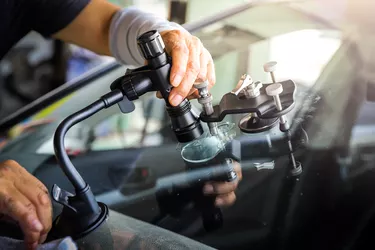
It happens. Cars fail occasionally, and it can be a real challenge for those who aren't mechanically inclined. A disreputable mechanic could sell you an expensive fix that might or might not be what your poor wheels actually need. You wouldn't be the first to fall victim to shady mechanic tricks or get ripped off by a mechanic.
Car repairs have the potential for going wrong just as any financial transaction does – particularly if you're arranging for repairs on your own rather than relying on your insurance company to pay for them. Insurers know the ropes of legal options should a mechanic not deliver the quality of work that was paid for, but you can take some steps on your own.
Video of the Day
Video of the Day
When You Pick Up Your Car
First, resist the urge to swipe your credit card, grab your keys and take off when you're picking up your car after repairs. Don't pay for anything until you've reviewed the bill and you feel pretty confident that you understand what work was performed and why.
And this is a big one: Ask for your old parts if any were replaced by new ones. You want to know that those line items on your bill really were performed. Your old parts are proof that they were removed and hopefully replaced by new ones.
It could be a red flag if the mechanic can't or won't give them to you. Follow up in writing to confirm that this is indeed what happened should you eventually have to seek legal recourse.
Dealing With the Mechanic
In a worst-case scenario, you won't understand your bill, you won't get an adequate explanation for things you're unclear about, you can't get your old parts and your car goes toes up sometime later. Now you're entering into legal territory, so you'll want to be careful as you're dealing with the mechanic.
Be civil, calm and explicit. Explain concisely why you think your car wasn't fixed properly and what you want, whether it's a full or partial refund or additional work at no charge to replace or repair whatever wasn't fixed right the first time. You might even take the vehicle to another mechanic first who can confirm that the work was performed incorrectly, then approach the first mechanic again after you're armed with this information.
Write another letter to the first mechanic, repeating what relief you're asking for and outlining the facts of the case, and send it by certified mail. Keep a copy for yourself. Be articulate and firm, but non-threatening. There's a chance that a judge is going to review that letter at a later time.
Your Legal Options
You'll have the burden of proof if you do have to go to court and sue to get your money back or for other relief. You'll have to establish to a judge's satisfaction that the car mechanic didn't fix the problem due to issues of fraud or negligence. You must establish that your problem isn't a legitimately honest mistake and that the mechanic refused to work with you to remedy the situation.
The exact legal process can vary depending on your state. You might do best to enlist the help of a local attorney if the repair bill was significant, although it might not be worth it if the attorney will cost you more than the repair charges that are in dispute.
You can always report the mechanic to your state's attorney general if the idea of fighting it out in court is more than you want to deal with. Check for licensing boards in your state as well, or a consumer protection program you can report to. Again, what's available can vary by jurisdiction.
Don't Refuse to Pay
You might want to resist the urge to refuse payment or to notify your credit card company not to honor the charge if you paid by card. In either case, the mechanic might sue you to recover what they allege you owe. This puts you on the defense.
Depending on your state's laws, the mechanic might be entitled to keep your car if you refuse to pay. They can file a mechanic's lien against the vehicle and sell it to recover what they allege you owe. You could end up in court to argue the issue even if you didn't particularly want to go that route in the first place.